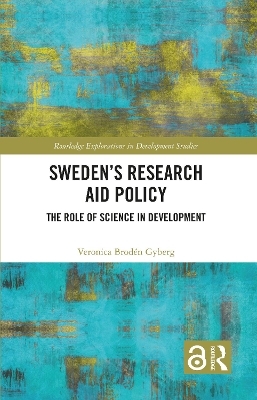
Sweden’s Research Aid Policy
The Role of Science in Development
Seiten
2024
Routledge (Verlag)
978-1-032-50931-0 (ISBN)
Routledge (Verlag)
978-1-032-50931-0 (ISBN)
- Lieferbar (Termin unbekannt)
- Versandkostenfrei innerhalb Deutschlands
- Auch auf Rechnung
- Verfügbarkeit in der Filiale vor Ort prüfen
- Artikel merken
This book analyses how The Swedish Agency for Research Cooperation with Developing Countries (SAREC) and the Swedish International Development Cooperation Agency (Sida) have worked to promote science in low-income countries.
Science and technology have long been considered key for development, problem solving and education in low-income countries, and Sweden has been at the forefront of efforts in this area, as one of the first countries to formalize research aid.
This book analyses how the Swedish Agency for Research Cooperation with Developing Countries (Sarec) and the Swedish International Development Cooperation Agency (Sida) have worked to promote science in low-income countries. In doing so, the book tackles challenging questions around whose knowledges and capacities count, who sets the research agenda, how knowledge resources are distributed, and how complex donor–recipient relationships serve both to address and inflate these issues. Through a discursive analysis of policy material and interviews with former directors at Sarec and Sida as well as other key persons, the book traces how perceptions of the relationship between research and development have shifted over the last five decades.
Pointing to why long-term collaboration is necessary in order to contribute significantly to capacity building, as well as highlighting more general tensions relating to the production of knowledge, Sweden’s Research Aid Policy: The Role of Science in Development will be a valuable resource for advanced students and researchers of foreign aid, development cooperation and the history of science and technology.
Science and technology have long been considered key for development, problem solving and education in low-income countries, and Sweden has been at the forefront of efforts in this area, as one of the first countries to formalize research aid.
This book analyses how the Swedish Agency for Research Cooperation with Developing Countries (Sarec) and the Swedish International Development Cooperation Agency (Sida) have worked to promote science in low-income countries. In doing so, the book tackles challenging questions around whose knowledges and capacities count, who sets the research agenda, how knowledge resources are distributed, and how complex donor–recipient relationships serve both to address and inflate these issues. Through a discursive analysis of policy material and interviews with former directors at Sarec and Sida as well as other key persons, the book traces how perceptions of the relationship between research and development have shifted over the last five decades.
Pointing to why long-term collaboration is necessary in order to contribute significantly to capacity building, as well as highlighting more general tensions relating to the production of knowledge, Sweden’s Research Aid Policy: The Role of Science in Development will be a valuable resource for advanced students and researchers of foreign aid, development cooperation and the history of science and technology.
Veronica Brodén Gyberg is an associate professor at the Department of Thematic Studies: Environmental Change at Linköping University, Sweden.
1. Science for development: the roots and branches of aid to research 2. Research aid: mutually beneficial cooperation or neo-colonial science? 3. Theoretical perspectives and methodology 4. 1973–1979: Tracing foundations 5. 1980–1990: Settling in and becoming pragmatic 6. 1991–1997: Polemic revival and the intertwining of localism and universalism 7. 1998–2008: Constructing sustainable knowledge societies 8. 2009–2020: Tackling global challenges through transformative innovation? 9. Concluding discussion: the boundary organization’s conundrum
| Erscheinungsdatum | 23.08.2024 |
|---|---|
| Reihe/Serie | Routledge Explorations in Development Studies |
| Zusatzinfo | 8 Line drawings, black and white; 8 Illustrations, black and white |
| Verlagsort | London |
| Sprache | englisch |
| Maße | 156 x 234 mm |
| Themenwelt | Naturwissenschaften |
| Sozialwissenschaften ► Politik / Verwaltung ► Europäische / Internationale Politik | |
| Sozialwissenschaften ► Politik / Verwaltung ► Staat / Verwaltung | |
| Sozialwissenschaften ► Soziologie ► Spezielle Soziologien | |
| Wirtschaft ► Betriebswirtschaft / Management ► Unternehmensführung / Management | |
| ISBN-10 | 1-032-50931-7 / 1032509317 |
| ISBN-13 | 978-1-032-50931-0 / 9781032509310 |
| Zustand | Neuware |
| Haben Sie eine Frage zum Produkt? |
Mehr entdecken
aus dem Bereich
aus dem Bereich
Studienbuch
Buch | Hardcover (2023)
De Gruyter Oldenbourg (Verlag)
44,95 €
erfolgreiche Interessenvertretung durch Prozesskompetenz im komplexen …
Buch | Hardcover (2023)
Wiley-VCH (Verlag)
42,00 €


